Thousands of Canadians in Iran and Israel are taken between hammer and anvil. Air spaces are closed. Some communications are cut. Families in Canada live in anxiety.
None of these people will be saved. None of these Canadians in Iran will be saved if the Canadian government does nothing
said Shyun Aghdasy during an interview on Saturday with Radio-Canada.
This Toronto did not speak to his father stuck in Iran for an entire week. Communications – Internet and mobile phones – have been completely cut.
Aghdasy is one of hundreds of Canadian families who are desperately trying to get their loved ones out of the Middle East. His father went to Tehran to visit his parents on May 30. The war broke out between Iran and Israel on June 13. Since then, impossible to leave the country.
According to World Affairs Canada, more than 4,000 Canadians were recorded in Iran on Tuesday evening. More than 6,600 Canadians were in Israel, the West Bank and the Gaza Strip. These figures are probably undervalued, because the registration is voluntary.
Canada faces a major challenge in Iran. The country closed its embassy in Tehran on September 7, 2012, which complicates rescue operations. What is more, the country’s airspace is closed.
World
The father of Mr. Aghdasy, about fifty years old, is trying to present a stoic facade, he explained.
He will never admit it, but when I asked him if he heard the bombs, he said to me: “Yes, I hear them, but it seems far.” But everything you need is a bomb that explodes not far away.
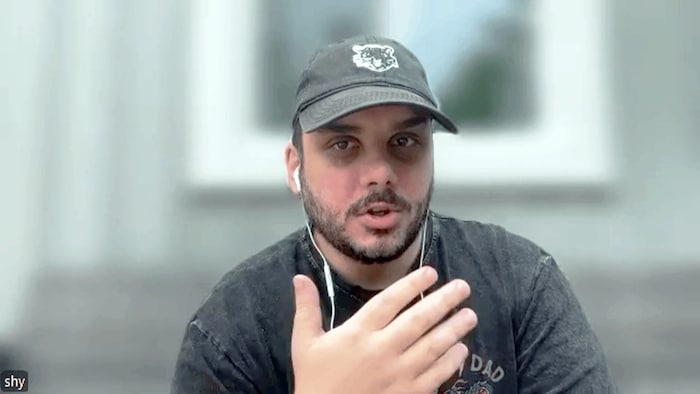
Toronto Shyun Aghdasy says he is concerned about his father and grandparents, who are in Iran.
Photo : Radio-Canada
Aghdasy said that the lack of communications is a big source of anxiety. I did not hear her again for a full week. Internet simply stopped working. […] If something had to happen, I would probably not know for several days
he said.
Internet was partially restored in Iran and access had been cut for about 62 hours, according to NetBlocksan internet surveillance organization based in London.
Aghdasy said he contacted the Canadian Embassy in Türkiye and that the agents told him that his father had to go to the Turkish border. However, this border is 2,000 kilometers from the place where it is. He adds that his grandparents are over 90 years old and cannot travel.
They don’t really give concrete answers. It is as if they said: “Once you are returned to the border, you can receive help.” But the problem is precisely to arrive at the border.
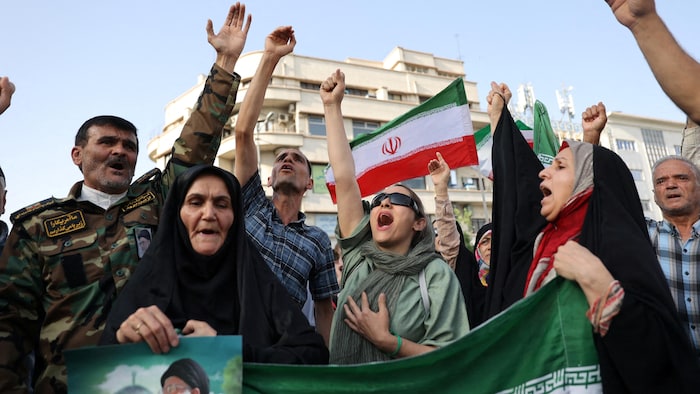
In Tehran, on June 22, people participated in a demonstration against the American attack on Iran.
Photo : Reuters / Majid Asgaripour/West Asia News Agency
Between the hammer and the anvil
Hossein Khodabakhsh lives this situation from the interior of the country. This Canadian went to Tehran to help her mother after a bone marrow transplant.
It was there when the first Israeli bombs fell on Iran on June 12 and 13. The whole city woke up around 3:30 a.m. […] I said to myself: “Oh! It finally happened!”
he said.
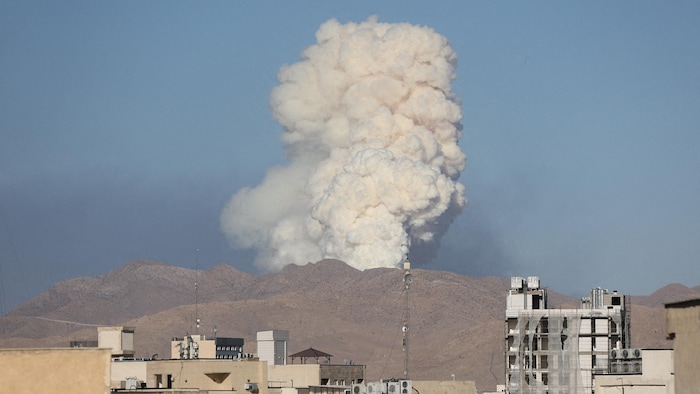
Smoke rises after an Israeli attack near Tehran on June 18.
Photo : Reuters / Majid Asgaripour/West Asia News Agency
He fled the capital with millions of other people.
About nine million people have fled [Téhéran]war, terror. It is the largest city in the country and I think it happened in just two or three days
he said on Friday during an interview with CBC.
The huge traffic traffic jams transformed the already dangerous situation into a source of unimaginable stress, he explained.
Friday, Mr. Khodabakhsh was in Ispahan, in the center of the country, with his mother. He explained that he is not sure what to expect. Everything has sort of stopped and we are just waiting to see what will happen.
In Israel, life in shelters
On the other side of the conflict, the Toronto Laurent Attali saw a different but just as intense nightmare. This grandfather has two daughters and two granddaughters who are in Israel. He says they are trying to get out of the country.
Mr. Attali claims that he no longer leaves his home: he watches Israeli television 15 hours a day. He watches where the rockets fall to find out if his daughters are in danger. It’s not livable like that
he said.
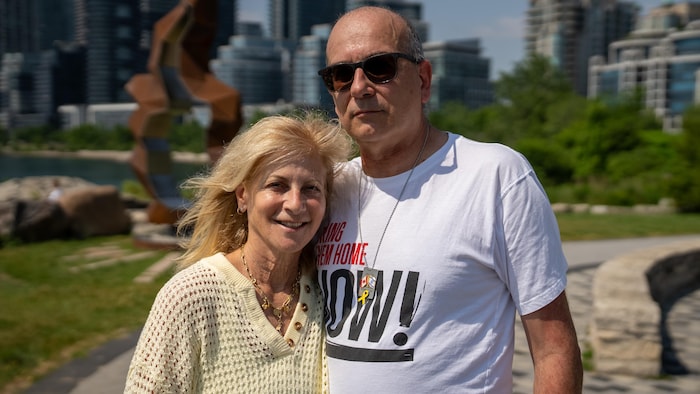
Laurent Attali (right) and his wife, Ilana Stein. Mr. Attali says he is plagued by anxiety.
Photo : Radio-Canada / Ken Townsend
I can’t dissociate myself from what’s going on there, it’s impossible
he added Sunday during an interview with Radio-Canada.
One of his daughters and grandchildren sleep in antibombes shelters, he said. Her second daughter sleeps on a sofa; At night, she must run towards shelter when the sirens sound.
Eat, sleep, eat, sleep. This is the only thing they do.
Two rockets fell near very personal places for Mr. Attali. There are two rockets that landed [près du] First building where I lived when we went to live in Israel. It fell just behind.
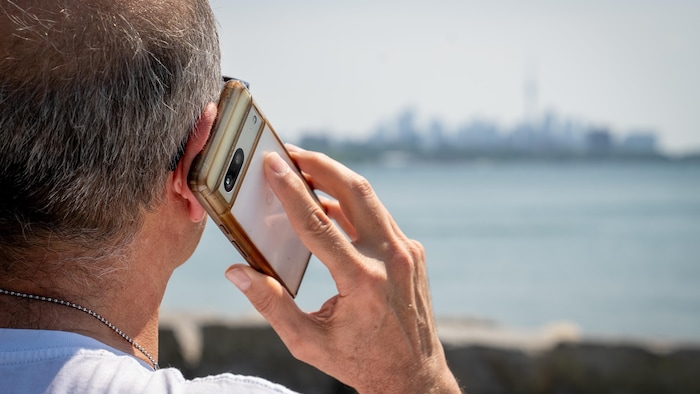
Laurent Attali frequently communicates with his daughters.
Photo : Radio-Canada / Ken Townsend
We are helpless
For his part, Mehdi Fallahi, who lives in the Ottawa region, explains that his sister lives in Karaj, 40 kilometers west of Tehran. She cannot leave the country.
She is over 80 years old and she is not mobile. And in addition, where would they go? Nowhere is comfortable. Some people went to the north [du pays]in other cities, but they face accommodation problems, they face food problems, everything. It is therefore a very difficult situation
he said on Sunday.
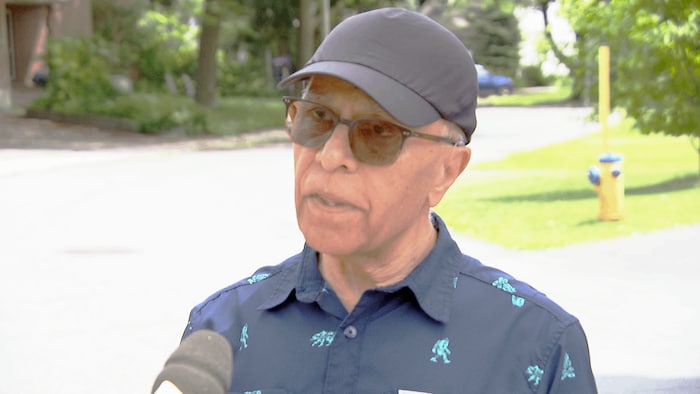
Mehdi Fallahi has been hosting a radio program in Ottawa for 35 years.
Photo : Radio-Canada
Mr. Fallahi has many friends in Tehran. All are shocked, all are surprised. We are helpless. We are frustrated. We don’t know what’s going to happen, of course
he said in an interview.
He appeals to the Canadian government. We need a humanitarian reaction from Canada
he added.
Government aid deemed insufficient
All those interviewed agree with Mr. Fallahi. However, they also say they are critical of the solutions offered by Global Affairs Canada.
For example, the government proposes the evacuation by Jordan of those who are in Israel. However, this solution worries Mr. Attali.
The problem is that Jordan is considered to be hostile territory for the Jews, with all the Islamists and the terrorists who still exist there, unfortunately
explained Mr. Attali.
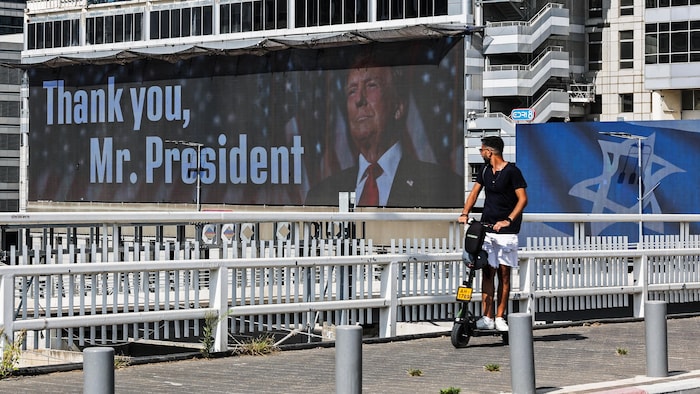
A man on an electric scooter passes in front of a giant billboard where thanks to the American president Donald Trump, in Tel Aviv, on June 22.
Photo: Reuters / Violeta Santos Moura
For Iran, the situation is even more complex. Mr. Aghdasy says that he contacted several deputies by email but that he has received no response.
François Larochelle, former diplomat and member of the Institute of International Studies in Montreal, recalls that Iran is a much larger country than Israel, which contributes to the complexity of the situation.
Going to land borders is a very big challenge for many Iranians. In addition, he points out that Canada has no embassy in Azerbaijan – one of the neighboring countries of Iran – either.
It is clear that the airport [de Téhéran] is closed and may be closed for a long time.
In addition, several airlines completely avoid the region. British Airways canceled its flights to the United Arab Emirates and Qatar on Sunday. Singapore Airlines has also canceled flights to Dubai.
And on the side of Israel, when the airspace is open, the government focuses on the repatriation of its citizens thanks to the operation Safe Return
launched on June 18, which limits the starting possibilities. Tel Aviv Airport should temporarily reopen on Monday, but only for this operation.
The Canadian Minister of Foreign Affairs, Anita Anand, is currently in Europe with Prime Minister Mark Carney. She made a statement about the Canadians who are in the Middle East Sunday afternoon in Brussels.
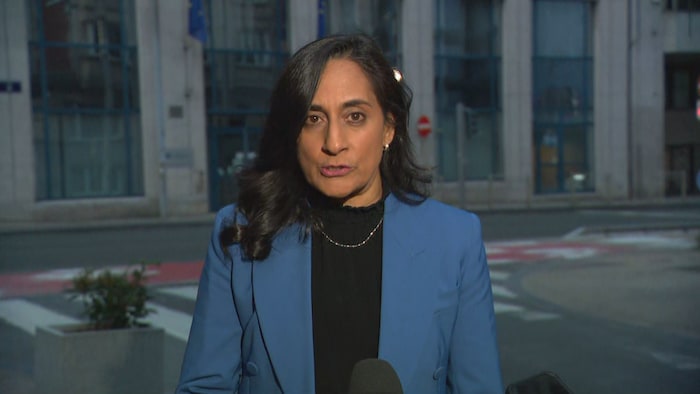
Anita Anand made a television statement in Brussels on Sunday.
Photo : Radio-Canada
We know that Canadians in the region are extremely concerned, including their families in the country. Therefore, we make sure to have complete consular support, especially at the borders where Canadians seek to leave. We also ensure that there are air and land transport options wherever possible. The most important thing for Canadians in the region is to register for World Affairs Canada in order to [que son personnel] may [les] Contact directly.
Ms. Anand made a similar publication on social media on Sunday.
Then, at the end of the afternoon on Sunday, World Affairs Canada responded by email to a request for details.
Global Affairs Canada (AMC) offers departure options to Canadians who asked for help to leave Israel and the West Bank and also supports those who leave Iran. The planned earthly departure today of Israel had to be postponed to tomorrow. AMC is also in regular communication with Canadians who asked for assistance in Iran, Israel and West Bank
y lit-on.
Following American strikes against nuclear installations in Iran, we reassess the security posture of our missions throughout the region, in close collaboration with our international partners. […] The members of the permanent rapid deployment team in Israel, the West Bank, Jordan, Turkey, Azerbaijan, Greece, Cyprus and Armenia are added to the hundreds of AMC staff on the ground. Consular and emergency aid is done in extremely volatile conditions. We will deploy other teams if necessary
continues this email.
Canadians in Iran should leave the country now, if they can do so safely. Canada is unable to provide help inside the country.
With information from Andréane Williams, Reuters, CBC and France-Presse

